
Arch
443/646: Architecture and Film
Fall 2007
The Truman
Show
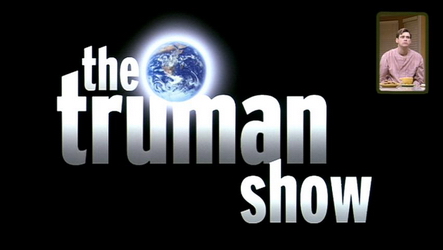
 |
Arch
443/646: Architecture and Film The Truman
Show |
 |
Discussion Questions:
Please answer the questions below. Use paragraph form. Your answer should be around 400 words. Email me your responses in Word .doc format to: tboake@sympatico.ca I will be posting these each week after the class. You should be prepared to deliver your answer in class -- but paraphrase, do not read it. PLEASE BE SURE TO READ THE GENERAL QUESTION IN THE RED BOX ABOVE YOUR SET, AS WELL AS LOOK AT YOUR IMAGES AND BITS OF TEXT. |
A |
The first set of questions speaks to the characters. Generally speaking we have a "framed" story or a story within a story. There are real life actors, pplaying actors who play real people in the film. How does this feed into a feeling of the uncanny in the presentation of the charater? How does this help to reveal the plot? How does the nature of the type of character or actor work into their presentation of the film character? | ||||
| 1. | 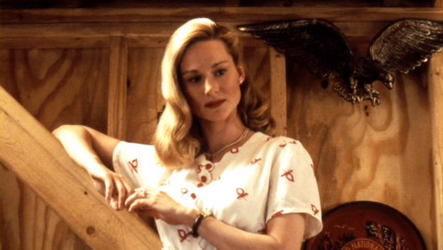 |
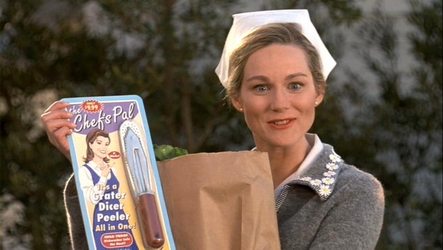 |
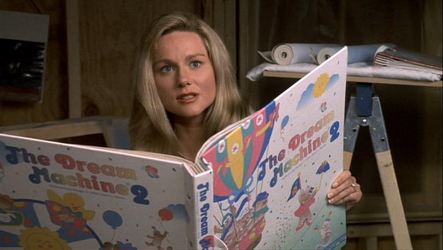 |
||
Adam Brady What if you had no control over your life, your job, your love? To say
that you are just a pawn in a very real game of chess? The Truman
Show is about one man’s game of life. The life that Truman
leads everyday is this game. |
|||||
| 2. |
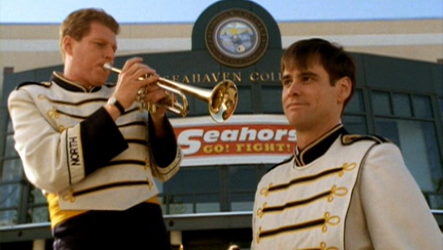 |
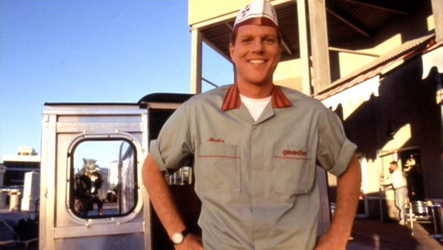 |
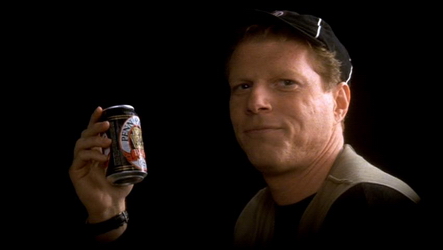 |
||
Cassandra Cautius One of the very opening shots of the film is a bit of an interview of
the actor Louis Coletrain, the man who acts as Truman’s best friend
Marlon, on the show. Here, Louis says; ‘nothing here is fake, only
controlled.’ Yet as the movie unravels it becomes quite clear that
Marlon is a fake friend, who’s sole purpose is to control Truman.
Marlon was brought into Truman’s life when he was 7 years old.
A full time commitment to a job, the adoption of an elaborate phony life
in an elaborate phony environment. The friendship, created at such a
young age, is based on manipulation. The creator of this world, Christof,
has strategically placed Marlon close to Truman. He has implemented this
relationship as a means by which to manipulate his world, control his
creation. Ultimately he makes use of Truman’s innocence, his natural,
unbridled emotions, his unquestionable trust in his life-long confidant,
to cushion the bubble of ignorance in which Christof has placed Truman.
At one point in the film Christof says that we accept the reality with
which we are presented. This is a constant truth of humanity, but leads
to questions of humanitarian treatment when any person would be so bold
as to attempt to skew one person’s reality in relation to the rest
of the world, for the entertainment of the rest of the world. |
|||||
| 3. | 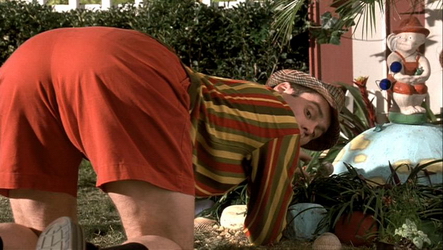 |
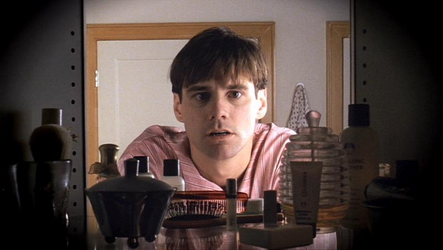 |
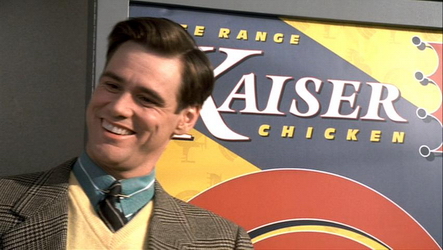 |
||
Alexander Chan The nature of Truman is very ambiguous because he shares the role of
the director with Christof. Truman is the creative genius in the film/show
while Chirstof is the exploitive genius. In order for there to be a show
that is captivating Truman must provide the content and Christof provides
the infrastructure to do so. Therefore, I believe Truman is the more
significant but mostly unaware part of the director (God). |
|||||
| x | 4. | 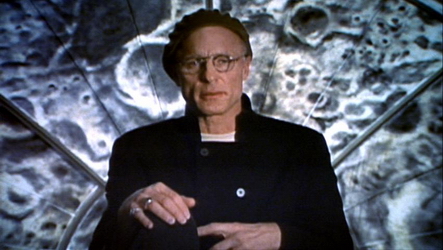 |
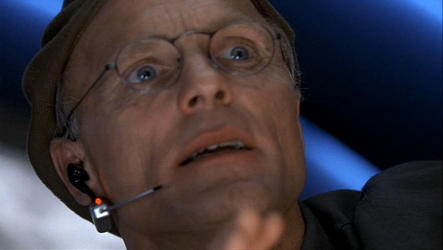 |
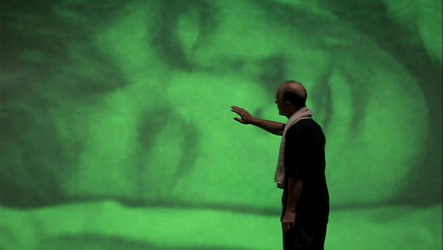 |
x |
David Henderson Every aspect of Truman’s world is an elaborate fabrication, from
the specifically placed products to his family and friends. Yet the most
important person in Truman’s life is someone that he has never
met. Christof, the creator of the Truman Show, controls the people, events,
and even the weather in Truman’s world. Christof is perhaps the
character that generates the strongest feeling of the uncanny in the
film mainly because of the amount of power he has. |
|||||
| 5. | 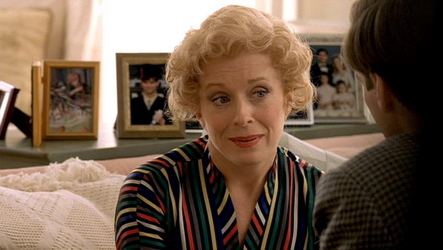 |
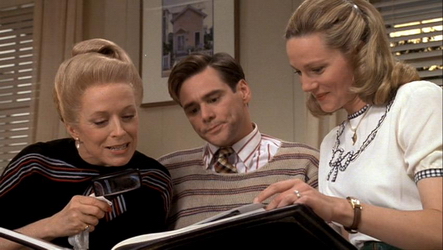 |
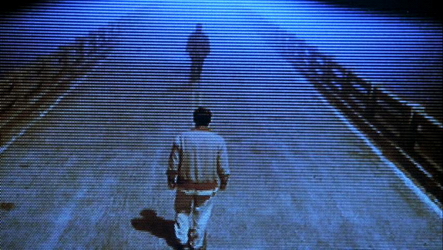 |
||
Minwoo Lee There is a most rudimentary assumption in the lives of people, sometimes
untrue but nonetheless fundamental; you are the child of your parents.
The familial relationship, the so called blood is thicker than water,
is the most intimate and tightly knit interpersonal relationship in a
person’s life. The theatrical roles of Truman’s parents
are the most brute breakdown of physical reality, a decadence of all
fundamental principle that belies all natural assumptions. Only
when we find out that even the parents are of fictional existence, we
realize that indeed there is nothing real in Truman’s life.
|
|||||
| 6. | 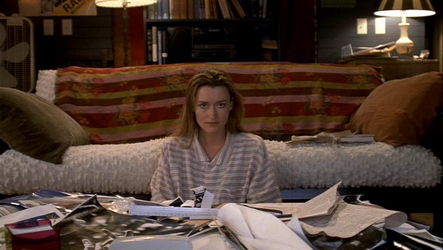 |
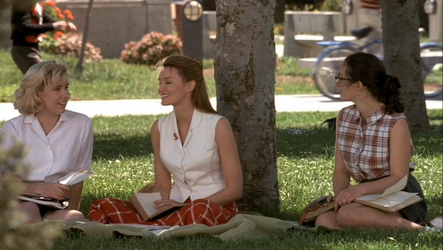 |
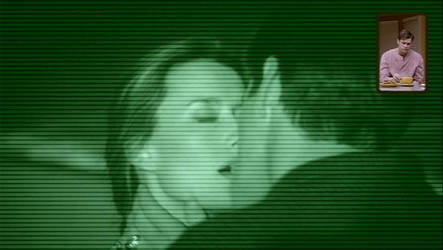 |
||
Paula Lee The framed strory within a story, that one’s life is part of a tv show that is being scripted and played out by the people around him for a watching audience of billions, is an uncanny case of reality imitating fiction as one’s reality is bound in the unreal- the irony arises from the film setting up Truman’s idyllic lifestyle and then revealing to its viewers the subtle intrusions the TV show makes into the familiarity of reality. The viewers first get introduced to Sylvia in the film, as she introduces herself as Lauren to Truman: this is interesting as her real name as an actor is Lauren but in the film this name is just a fake one she tells Truman in the show when her real name in film is Sylvia- confusion within confusion. She is an important character as she is the only one to hint Truman of his fake life. She enters the film as an extra in the film within film then she is whisked away by the TV producers to the real world within the film. Sylvia is one of the characters who, like Truman’s father, makes viewers and Truman realize of fake reality within the movie.
|
|||||
| 7. | 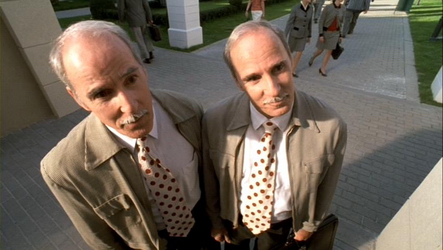 |
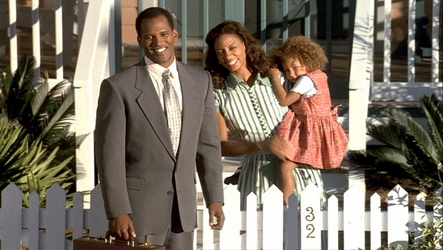 |
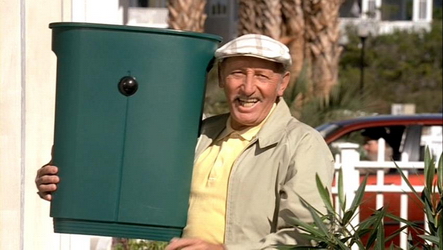 |
||
Evelyn Lo The family across the street, the elderly
neighbour, and the two twin gentleman play an integral part in creating
the framed story within the story, they add to the unsettling uncanny
feeling depicted by the plot of the film, as well as help to further
the plot itself through their rigidly choreographed placements in
Truman’s life, their
relationship to him and their dialogue and interaction with him. The
extreme coordination with which they play their roles as real people
his life give a strong sense of the staged and idyllic theatre that
is Truman’s life. These characters play a dual-role- they help
to manipulate Truman’s everyday actions, as well as serve practical
purposes – providing ideal locations for additional cameras with
interesting and personal angles to add variety and interest to the
Truman show. |
|||||
8. |
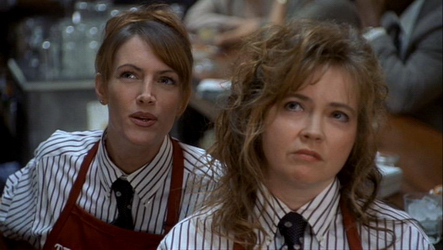 |
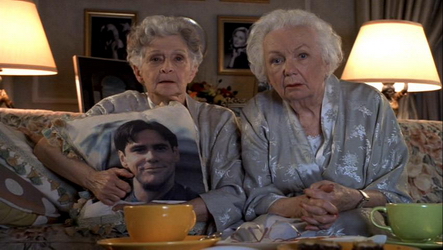 |
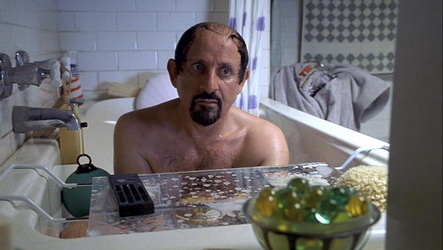 |
||
John McFarlane The characters outside Truman’s world have effects on several levels of comprehension to make their presence at once comforting and uncomfortable. They are people who are fans of the Truman Show; watching Truman and the actors in his life. We also understand them as actors playing people watching actors playing people on a TV show. We further understand them as characters which we watch: we are people watching actors play people who watch other actors play people in Truman’s world, in which they maintain the act for him. It is this expanding understanding that makes us uncomfortable in that it draws us into the movie’s matrix of surveillance. As we expand our appreciation of who is watching who and who is acting for who, we become aware of the movie’s reference to our relationship to the content and people we watch on television, film, and computers. Simultaneously, the characters we see watching the Truman Show are the most endearing because they are the most easy to relate to since they represent the anybodies of the world, a group we belong to. Just as they cheer for Truman as the character most embodying what they find real and compelling in the face of the godly Christof, we cheer for them in their minor joys and empathize with their minor sorrows as they express their emotions over the show and live their lives on our screen. Our empathy for them is linked to the ability of these outside characters to represent for us the heartfelt authenticity in the movie, which itself is so focused on reality’s mutability. “We accept the reality that is given to us” says Christof, explaining why Truman hadn’t doubted his constructed reality earlier. And as described by Walter Benjamin in “Art in the Age of Mechanical Reproduction,” in a state of distraction we experience film as reality like no other type of art except architecture. What the Truman show does is to deconstruct the construction of reality, showing the power structures at work and how they maintain their power. That is to say the Truman Show demonstrates the power of understanding, in this case that of Truman, to break the prison of his own fear and ignorance. The Truman show by this reading can be considered a retelling of Plato’s allegory of the cave in the age of the film. Truman’s central storyline is comforting and reassuring in its (relatively) happy conclusion. The peripheral minor stories of the people watching his story are disquieting because they imply an obligation on our part to understand our own constructed reality and its creators and in doing so to outgrow them.
|
|||||
| 9. | 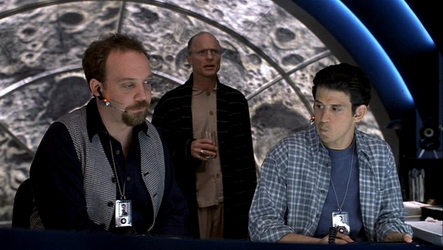 |
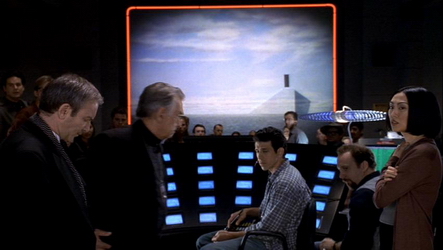 |
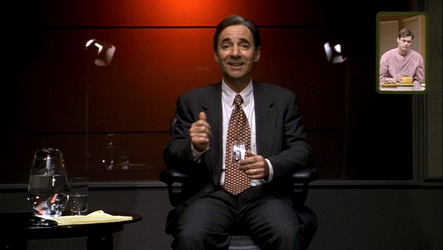 |
||
Sava Miokovic In this film we are constantly questioning the authenticity of the characters. Because
the parameters of the movie are so regular, we can easily relate to it,
take it for a representation of reality. Although it is made clear
from the start of the movie that Truman is living within a show, interacting
with actors, we often fall into the everyday events of his life and forget
this fact, in the same way the fictional audience does in the film and
the way we do whenever we watch a tv show ourselves. We are continuously
reminded that Truman's reality is a deception. This is done in
many ways, including the footage of the actors receiving instructions
from Christof, a camera angle or a glitch in the running of the mask. Continuously
slipping between these two frames of perception, the question of who
is real and who is acting is imprinted on the forefront of our thoughts
so strongly that when we slip out of the movie, we propose the question
to the people surrounding us. The thought that the people in our
lives could be deceiving us, not necessarily being actors in a grand
tv show but that we could be directed by motives other then our own,
makes us uncomfortable.
|
|||||
B |
The second set of questions speaks to the general notion of this story. It "pre-dates" current "reality" TV shows by almost a decade. How does this impact OUR 2007 reading of the film? When answering these questions please speak to the uncanny as both an issue of seeing the film "now", as well as to its state in the year 1998. | ||||
| 10. | 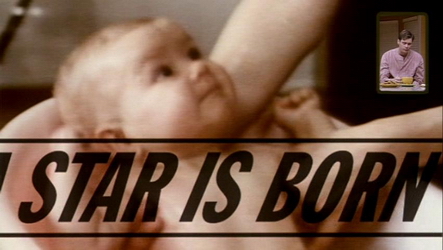 |
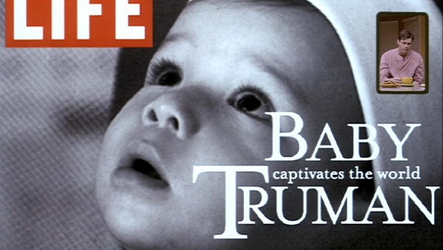 |
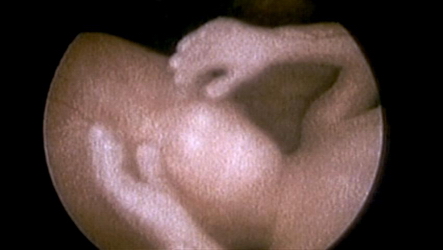 |
||
Reena Mistry Seeing the film in 2007 far exceeds the uncanny effect of seeing it in 1998, due to its proximity to today’s reality that causes the disturbing notion of this story seem increasingly probable. In 1998, “reality TV” had not yet become a reality. Seeing the movie in this context can allow for themes in the film, (such as imprisoning real people for entertainment, deceitful reality, continuous live broadcasted real people) to be overlooked as fictional, comfortably removed from the reality of 1998. Television was still governed by good old sitcoms like Boy Meets World, Dawson’s Creek and Friends. By 2007, we have witnessed: Survivor, The Bachelor, Big Brother, American Idol, The Apprentice, etc. Prying into the real emotions, secrets, insecurities, and lives of normal everyday people has become a disturbing yet acceptable reality. What these shows have in common however, is the willingness of the “nobodies” to knowingly and consciously permit “reality TV” to broadcast their lives to millions. What differs with The Truman Show is that the star is born to the show; he has no idea that he lives a fictional life that is watched constantly by millions of strangers, and the greatest overarching uncanny fact is that the world has allowed for a baby to be born to media. Truman, “the first child to be legally adopted” by a television show, manipulates and imprisons an innocent life for the entertainment of others. What right does media have to “take a baby and turn his life into a mockery?” Also the malign inversion occurs when the network executive warns, “For God's sake, Chris! The whole world is watching. We can’t let him die in front of a live audience!” To which Christof responds, “He was born in front of a live audience.” This sudden transformation of the creator into the destroyer shows the disturbing complete control that media has on Truman’s life. His unwilling and unknowing birth into a television show was just a matter of arriving on schedule for the pilot episode. The proximity of this film to today’s reality cause the same disturbance generated by the uncanny valley. Our society has already produced twisted people out of child celebrities, raised in the entertainment business (Michael Jackson for example) but never to the extent of being unknowingly and literarily born to media… but perhaps that is just a matter of time.
|
|||||
| 11. | 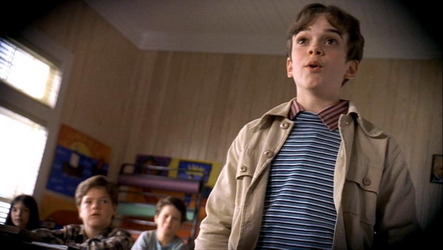 |
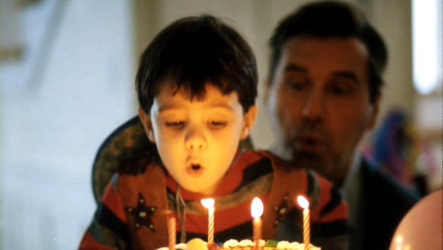 |
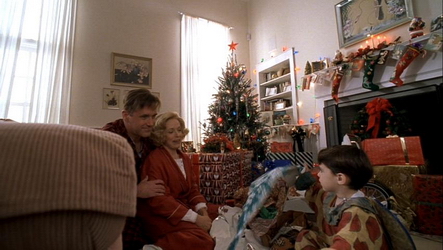 |
||
Melissa
Ng The Truman Show is a film based on the constructed
reality of one man’s life, from birth through childhood, and presently
as an adult. The creators of the 24-hour televised program have
constructed a utopian suburb based on new urbanism principles; not only
is the functioning of the town seemingly ideal, but everyone part of
the small community is pristine as well. The impact of Truman growing
up in a constructed environment has had a great influence on shaping
his future as an adult - though consequently in the film, he is able
to surpass this manipulation of his beliefs and fulfill his initial aspirations. As
Truman begins his schooling, he is instantly intrigued by geography and
the act of discovering. He expresses to his teacher that he wishes
to become an explorer, much like the great Magellan. |
|||||
| 12. | 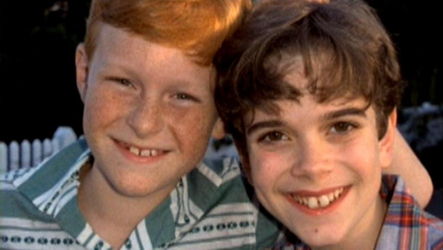 |
 |
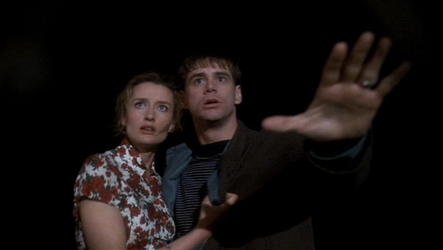 |
||
Aisling
O'Carroll Our
current reading of the Truman Show is affected by our current position
of being surrounded by reality shows in the media. Because we are so
used to seeing reality television shows, we are not as surprised by the
nature of the Truman Show. It does not seem as shocking that numerous
people would choose to have their lives played before the world on national
television. At the time, not only did it seem uncanny to have the main
character, Truman, in a concocted reality in which he is unaware of his
condition as a television star, but it is also uncanny that the rest
of the cast consciously decided to dedicate themselves to the show and
put their lives in front of millions of viewers. The idea of being continuously
filmed would have been quite an uncanny concept, however now it is so
common in much of media culture that it seems less striking. |
|||||
| 13. | 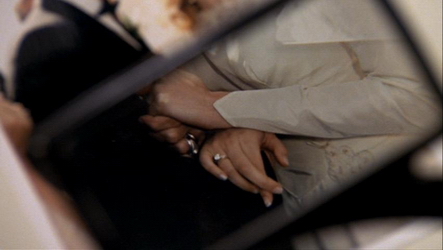 |
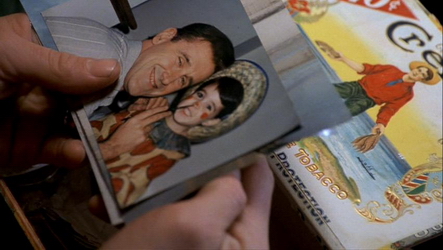 |
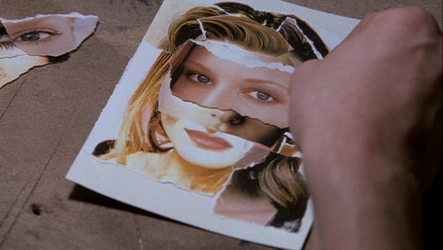 |
||
Shannon Ross Photographs in the truman show play an important role in establishing
an identity for Truman. When confronted with the realization that
his world is fabricated he relies on his photgraphs to comfort him in
the fact that his past was real and that his fondest memories are true. Similarly
in Blade Runner photographs are given to the replicas in order to acheive
the same recognition of existence and identity. What is different
from the two movies is that Truman had actually experienced the events
but unfortunately for him he realizes at the end of the movie that they
were all manufactured and he is essentially a slave to the programmatic
control of a television producer. |
|||||
| 14. | 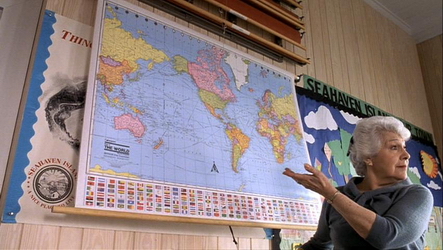 |
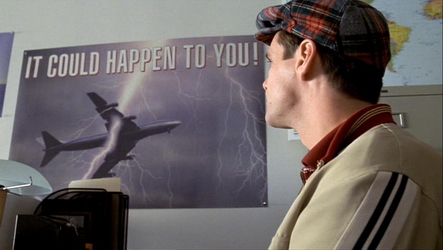 |
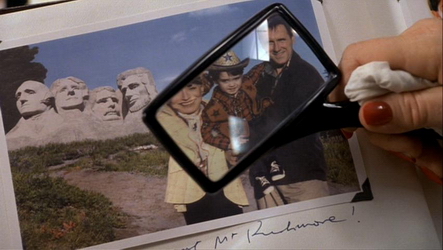 |
||
Terry
Sin Today the manipulation of truth in the media seems to be something that
is understood by a greater portion of society. However I think it would
seem a bit more ridiculous if one was to view this movie in 1998. A teacher
that discourages a student to explore, a travel agency that causes fear
and a fake Mount Rushmore would seem to be silly at the time. In a 1998
viewing, the media in the movie would seem uncanny because of its control
over Truman. Within his world, things that we take granted are manipulated.
However, in the current state of the world, it does not seem as fictional.
The middle image reminds us of the fear of flying, post 911. With the
rise of Photoshop, the third image doesn’t seem that unreasonable.
Thus, in our current viewing, the manipulation of truth may seem uncanny
to us, because it is possible that our world is being filtered. With
the technology and resources available to the media (such as news stations),
manipulation is very much a possibility. Furthermore, in reference to
current reality and hidden camera shows, it seems like the person you’re
talking to in the mall could just be an actor. |
|||||
c |
The third set of questions speaks to the creation of the "dome" that is used to make the show. | ||||
| 15. | 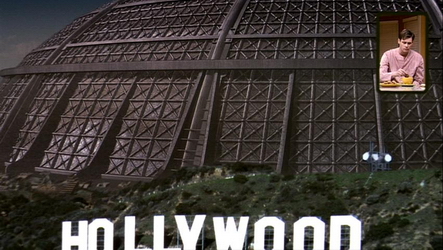 |
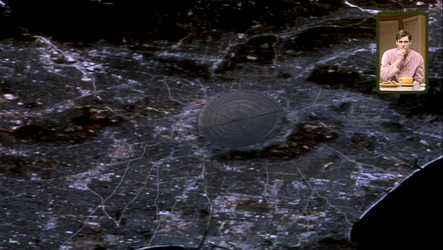 |
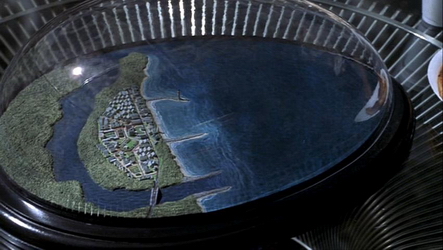 |
||
Helen Tout I assume that the dome was created before Truman was born or very early
on in his life. The whole purpose of the creation of this dome was to
come up with a contained reality, in which Truman could grow up and experience
what he thought was real life but is really a giant sound stage where
people all over the world were watching him through hidden cameras. The
purpose of the dome is two-fold, it has to be a convincing enough reality
for Truman and also the audience to accept, but it also has to allow
the crew to have full control over everything that happens inside of
it like the weather, traffic and the characters to name a few. The only
thing they don’t have full control over is the actions of Truman,
yet they control everything that he sees and experiences. All of Truman’s
friends and family are actors. Only Truman doesn’t know that he
is on TV, and this is probably why people watching relate to him so well.
We’ve all felt paranoia that perhaps we are ‘being watched’ at
some point, and to watch this controlled ‘reality’ television
may feel even more real than their own lives to most people. This is
uncanny to watch because it makes us think of our own reality, and what
illusions the media and even ourselves draw for us. |
|||||
| 16. | 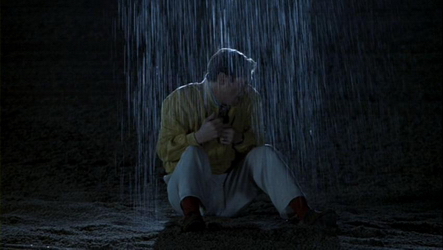 |
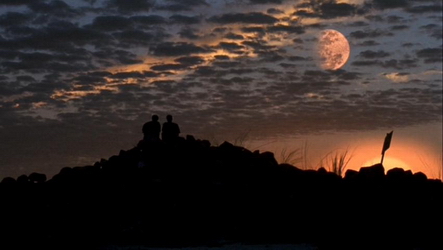 |
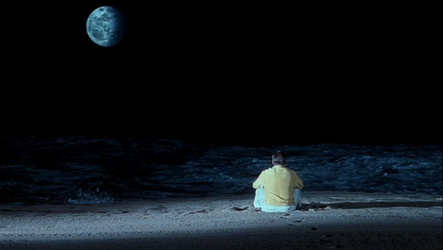 |
||
Jamie
Usas The dome, within which Truman's reality exists, is represented through seemingly artificial composition and picturesque imagery, that is created and controlled by Christoph, the director “The Truman Show”. Although the viewer is initially unaware of the true nature of Truman's reality, subtle and at times unsubtle “tells” are provided to the viewer, suggesting a latent reality just below the surface. The three images above illustrate the varying degrees of subtlety that are presented to the viewer, revealing the artificial nature of life within the dome. The first image depicts Truman on the beach during a moment of contemplation, during which it begins to rain. The falling rain is restricted strangely to the area directly around Truman, himself. Upon Truman's realization of this phenomena, torrential rain subsequently erupts all around him, referencing the cartoon cliché of the personal rain cloud that follows an individual, as well as suggesting the artificial nature of Truman's reality, through an unsubtle manner. The second image uses impossibility and the picturesque to infer Truman's simulacra by composing an image of false reality. The reality suggested in the image of Truman and Marlon; setting on a hill top, watching the sunset while the moon rises, is seductive, yet at the same time, impossible. The rising moon cannot be viewed in the same region of the sky as the setting sun, scientific fact. The false nature of this image is subtle, but clear. The viewer is struck by their uncanny awareness of the realization whether conscious or unconscious of the scientific impossibility. The third image, Truman on the beach staring into a giant moon, similarly demonstrates the picturesque compositions presented to the viewer throughout the film. Although this image presents no clear impossibility, the illustration of a perfectly rendered, enormous half-moon, positioned with seeming deliberate composition, within a picturesque sky, becomes suspicious, after being encountered at a multiple of moments throughout the film. The uncanny arises in the viewer when it is realized that a true representation of reality would not be characterized by so many examples of the picturesque, and that real life is seldom so perfect. By way of the mentioned examples, the film succeeds in providing the viewer with accessible clues, both unsubtle and subtle, which lead to the realization of the true nature of Truman's reality.
|
|||||
D |
The fourth set looks at the impact of the specific camera angles and devices and the uncanny nature of the film. Think about the difference between what a person notices when they first see the film, and what might be more perceptable upon repeated viewings... How does the size of the projection and nearness of the viewer affect the peripheral part of your vision? ie. movie theatre vs. TV... All of these things factor in. Also, the use of Seaside, a real town. | ||||
| 17. | 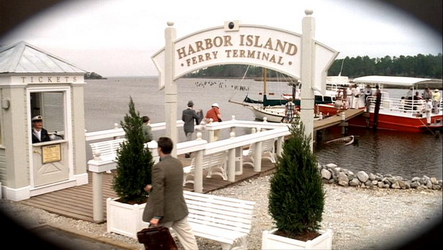 |
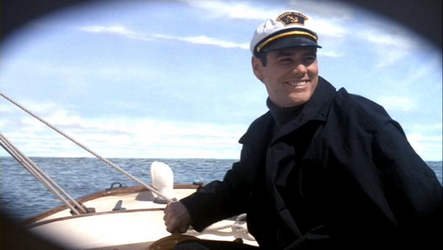 |
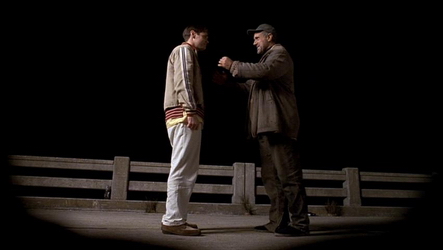 |
||
Susan Varickanickal Having the oval mask around the image reminds the viewer that Truman
is the star of a man made and operated world, where everything can be
controlled and manipulated except for Truman’s own behavior. A
first time viewer would probably interpret this shot as a reminder that
Truman is a character in a show and is constantly on camera, and the
oval mask may then go unnoticed; however, watching it a second time the
viewer might interpret this shot more of an invasion of privacy rather
than entertainment. By using this specific type of filming its
creates the feeling of looking through a peep-hole. The
idea of watching someone without them knowing they are being watched,
falls into the realms of the uncanny. Using the oval mask around the images clearly defines the plot of the TV show, such that it forces the viewer to recognize Truman’s role in the show. He is the star…the Hero, and this type of filming demonstrates that very well. |
|||||
| 18. | 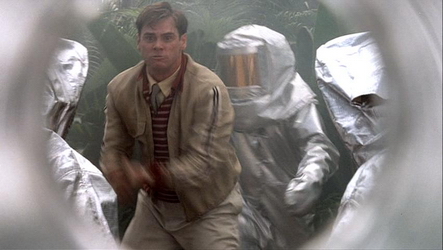 |
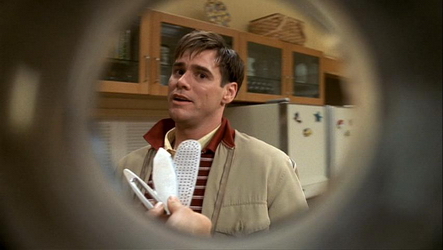 |
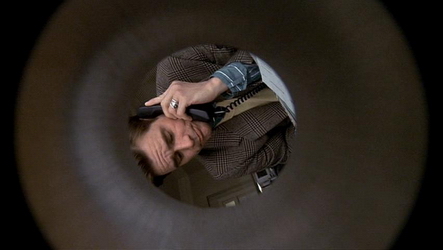 |
||
Chao
Lun Wang Viewing through holes or tiny apertures evokes a strong sense voyeurism. They are for surveillance purposes from the most unnoticeable placements such as a pencil sharpener. This feeling would be even stronger if the film is being viewed on a personal TV screen since we feel more intimate with the device and the events on the film becomes more personal. We become the audience in Truman’s life. The first two images in particular shows Truman in attempt to escape the false world that he begins to notice as he confronts the actors in him life. He is staring right into the camera. Though he doesn’t know that the camera is there, but he is challenging the authority of the producer who has been playing god in his life, and also the conscious of the audience. The most uncanny aspects of these camera placements is the nature of their concealment. Though Truman eventually begins to suspect that everything he does is monitored, controlled, and contrived, when he notices the flaws in the stage, he is still watched from beginning till end, not able to uncover a single spy cam. This is can lead to a reflection of our own world in which we often find surveillance, manipulation, and social control behind the masks of corporate firms, media, and political groups. Yet no one tries to objectify these hidden means of control since they have become a method to maintain a social stability.
|
|||||
| 19. | 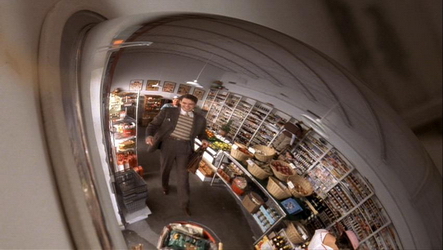 |
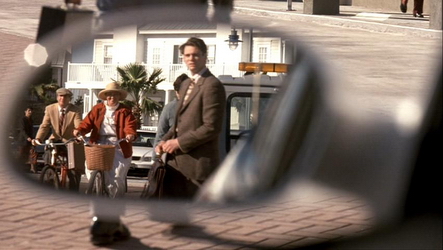 |
 |
||
Benjamin
Wong The use of mirrors plays a large role in creating the feeling of the uncanny throughout the film. The shots that focus specifically on the mirrors serve to emphasize the feeling of being under constant surveillance. This is first established with the shot shown in the third image, where Truman is in front of his own bathroom sink. Even in such a private space as his own bathroom, millions of people around the world are watching Truman. At the beginning of the film, Truman is unaware of the fact that he is being watched. The bathroom mirror shot first occurs at this point. As Truman comes to the realization that his life has been a staged show, he begins to notice where the cameras are hidden. In a later bathroom scene, taken from the same angle within the mirror, Truman performs a spaceman skit. This is when the audience also begins to see the hints of Truman’s cognizance of his surveillance, which causes a change of roles. The audience is no longer within its own safe haven of voyeurism, but has to begin to face the questions of morality that come into light. The first image, similarily, is also a one-way mirror, in which a camera is presumably placed behind. The uncanny nature of this lies in the fact that these mirrors appear as regular, everyday objects, but are serving to hide so much from peoples' perception. No one ever really knows when they are being watched or not. Not only Truman, but also the whole town is under this constant surveillance. In the reality of the film, cameras would be placed within all of the homes in the town in order for the directing team to be able to keep track of everything going on. The second image shows another way in which the mirrors act to obscure the surveillance from view. This image is showing a reflection of Truman, with the angle and position of the shot suggesting that it is actually the view that someone else is seeing. In this sense, the mirror hides the voyeur from being noticed by the subject.
|
|||||
| 20. | 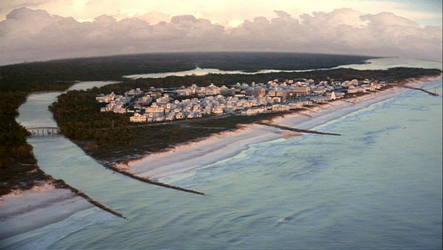 |
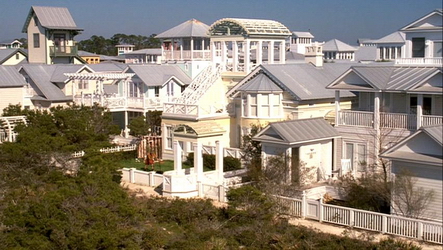 |
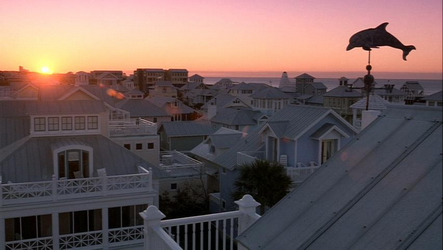 |
||
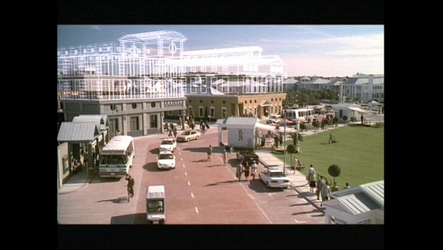 |
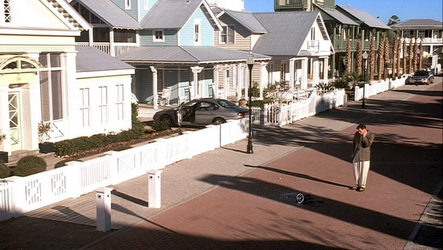 |
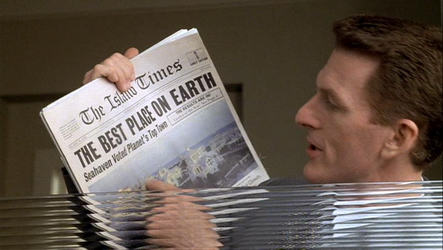 |
|||
Erin
Corcoran When the designers of the Truman show were searching for a set for the movie, the initial plan was to build the village of Seahaven on a studio back lot and use bits and pieces of architecture from the various architectural styles available on the lot; bits of Paris, the Wild West and Manhattan. However, because this would be a very costly option, and also because it would fail to yield the uncanny feeling of the ‘real but not real’ that the Truman show demanded, other sites were explored, first a barren typical suburban neighbourhood of cookie-cutter homes, and second the village of Seaside in Florida. Seaside, a four-hundred home development on the west coast of Florida is a New Urbanist creation with strict restrictions on building type, size and description. All buildings are built to be unique in their form, but are required to respect the overall style of the place, they must have porches, be fenced but not in the same style of the houses directly adjacent to each other and each must be maintained and have exterior decorations that conform to the overall sense of the village. It is a place populated predominantly by tourists and the rich, and is marketed as a “modern Victorian town with narrow streets, picket fences and homes arranged close together to encourage walking and neighborliness”. In its use as a town that is the set for Truman to live out his life, the usage of a real living town is uncanny in the fact that such a surreal place does in fact exist. Throughout the course of the movie, Seahaven is portrayed as a better than real life place, where the sun is always shining, life is better, cleaner, and perfect, and this element of perfection plays to the unreality of the Truman Show, a state that becomes ever more and more clear as the movie progresses and Truman becomes more aware of his situation. The fact that such a place could exist in real life plays to create a feeling that perhaps anyone could be duped into believing that their reality was in fact, not real. Also, when or if the viewer is aware that this town does in fact exist, they may come to ask themselves how such a place could be built and what kind of deluded people reside there. It is a fantasy of perfection, and it represents an ideal of escaping to somewhere cleaner and better in order to turn one’s back on the realities of day-to-day life. The fact that such a fantasy has been built and that people live there begs the question: Is it so easy to turn away from reality? And lastly, as to whether or not this fact is lost on the general public, I think the themes of idealism and questioning one’s reality are available and ready to be understood by any who view the film. The ironic intricacies of the fact that the town that is a set is in fact a real town does add a level of complexity to the message of the movie, but I believe that this could be understood by anyone so long as they were provided with the knowledge that this was filmed in a real town.
|
|||||
| 21. | 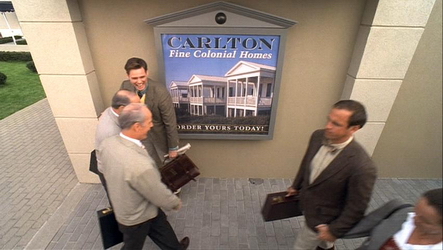 |
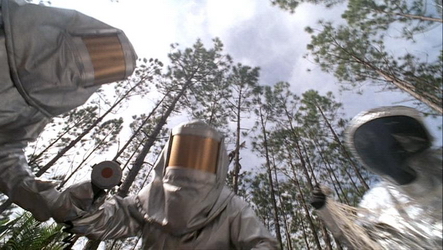 |
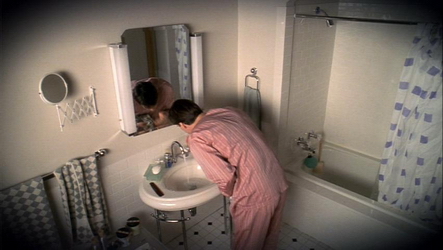 |
||
Matthias
Heck Many scenes of the movie imply the use of surveillance and secret cameras that are installed throughout the city to monitor Truman Burbank’s daily life. Of the more than 5000 cameras that are used for the Truman Show, many are attached at an appropriate covert location or the actors are supposed to have them on them. By using these hidden cameras, we as the audience get the feeling to be right in the middle of the events and to observe things in an “ultra-reality mode” from as close as the viewer might get. At encounters with various persons the view also changes to a worm’s eye view or a bird’s eye view. This has two different effects: Objects or persons appear bigger and details like buttons or hands, that play a major role in many settings, become the focus of a certain scene. Furthermore this creates the feeling of obedience/powerlessness or predominance. In the worm’s eye view (for instance the dog’s perspective when Truman leaves the house or when Truman is lying on the ground trying to fight off the nuclear plant security) an obedient feeling is transported. The opposite effect is achieved when the perspective changes to the bird’s eye view: when he meets the twin pair on his way to work and the perspective changes to the high angle shot or whenever we look through cameras that are installed at a certain height, we experience the feeling of predominance, furthermore the already small actors dwarf in contrast to Truman. Also, every so often the perspective is reduced to a circular aperture. This does not only put the focus on certain persons or objects, but it also implies a voyeuristic and intimate view, as looking through a spyglass or a peephole, hence the sensation of an emotional voyeuristic perception is created. In most of the cases the various scenes are connected by hard cuts, there are rarely any soft cuts in the movie. This also applies to the change of the worm’s eye view and the bird’s eye view, which are connected by hard cuts, too. Considering that the show is supposed to run live without almost any interceptions, those cuts supposedly simulate the nature of the live broadcast.
|
|||||
| 22. | 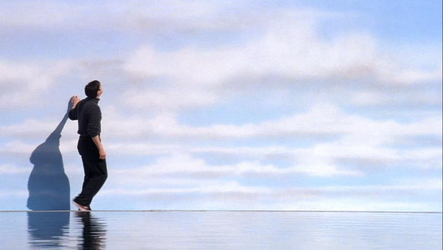 |
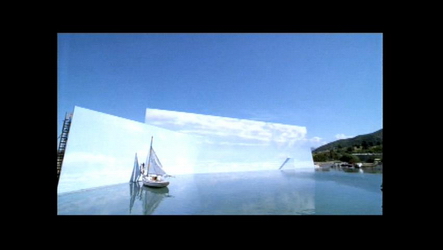 |
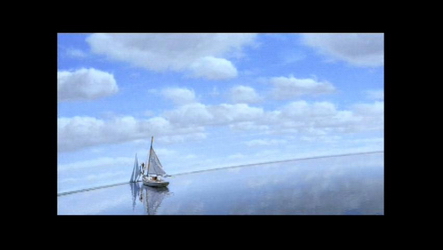 |
||
Suzanne Gibson Truman’s fears of water acts as the first boundary he must over come, in this case I’m reminded of the primate environments at the Toronto Zoo. The primates have a fear of water so around each exhibit there is a pool and the observer stand on the other side of the pool just above the level of the enclosed environment and the water. Similarly the water that encloses the island plays on Truman’s fears of water and ensures he will not escapes, and like at the zoo from above the director watches Truman’s every move. Like the primates at the zoo Truman seems content, as the director Christof explains ‘We accept the reality with which we are presented.’ And it is true very rarely do we question or for that matter even examine the world we live in too closely, so it is easy to believe that Truman believes and accepts his reality. To the audience who is outside of Truman’s ‘reality’ the set is an improbably ideal world, a world of gone by days, where neighbors greet each other over their picket fences and manicured lawns. But as one becomes aware of the artificiality of the Truman’s world the set becomes hyper real, the colors are too bright, the neighborhoods are too seamless, the movement of the people are too well planned, in total the set is so perfect that it only be artificial. In many ways this reality is parody of the ideal small town American community. However, once the fabric of Truman’s ‘reality’ begins to tear, he begins to realize that he is trapped in what maybe thought of as a false paradise. Everything is too perfect too well planned and Truman comes to understand that only by escaping will he ever have a chance to live a truly authentic life. Truman’s attempts to escape bring forth the next boundary set in motion by the producers, these boundaries tend to be less sociological and more staged boundaries, ranging from scary dogs, to staged forest fires, nuclear disaster and huge storms, couples with more subtle images of lighting hitting planes with the words this could happen to you, and newspaper headlines declaring Sea Haven the best place to live. These boundaries are merely meant to stop Truman from finding out the truth and discovering that his ‘reality’ is in fact an unreality. The last boundary is the physical boundary, that of the dome. In contrast
to the rest of the sets that are hyper real the dome appears extremely
artificial. The horizon line is visually shortened, and as the
boat gets closer it becomes obvious that the clouds are painted on. The
boat collides and punctures the set, and at this moment the artificial
condition in which Truman lives becomes obvious, both to Truman and the
viewer who’s able to feel the full impact of the disconnection
between reality and the unreality of Truman’s world for the first
time. The horizon meets the sky and Truman gets off the boat and
walks along the edge that is created by the two joining forces, creating
the surreal appearance of walking on water, and then there are the stairs
that lead to the exit, painted like the rest of the backdrop with only
their shadow betraying them. The play of shadows on the backdrop amplifies
the clash between something that moments before seemed so real to being
something obviously and completely artificial, heightening the sense
of the uncanny. |
|||||
| 23. | 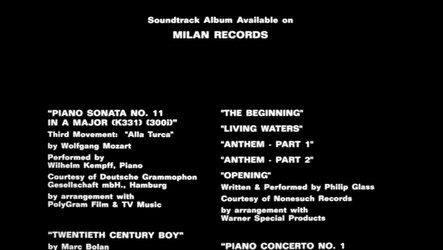 |
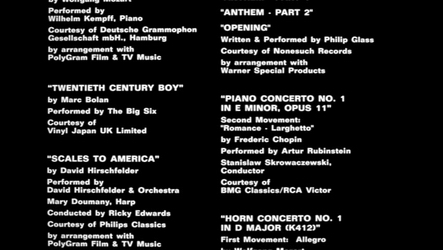 |
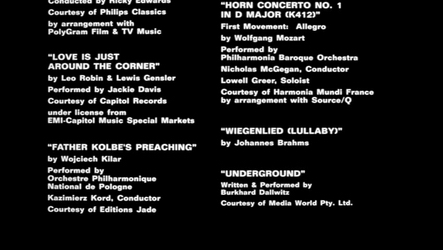 |
||
Kate Gould The music in the film The Truman Show is related to the conceptual
framework of the show itself. As the show is conceived as an around
the clock production the director, Christof, would play typical pre-recorded
elements for everyday events, which would be then be complemented by
live musicians. These artists could then improvise music to relate
to more pivotal moments. For most of the pre-recorded music Phillip
Glass and Burkhard
Dallwitz performed original pieces and reinterpreted classical pieces,
such as Wolfgang
Amadeus Mozart's Rondo
alla Turca and Horn Concerto No. 1 in D Major.
|
|||||
updated 23-Dec-2007 10:48 PM